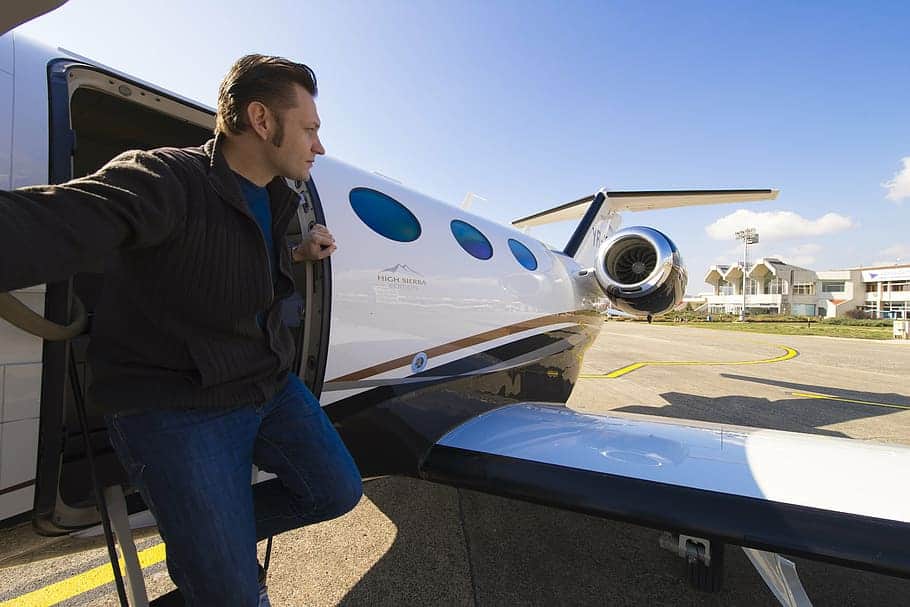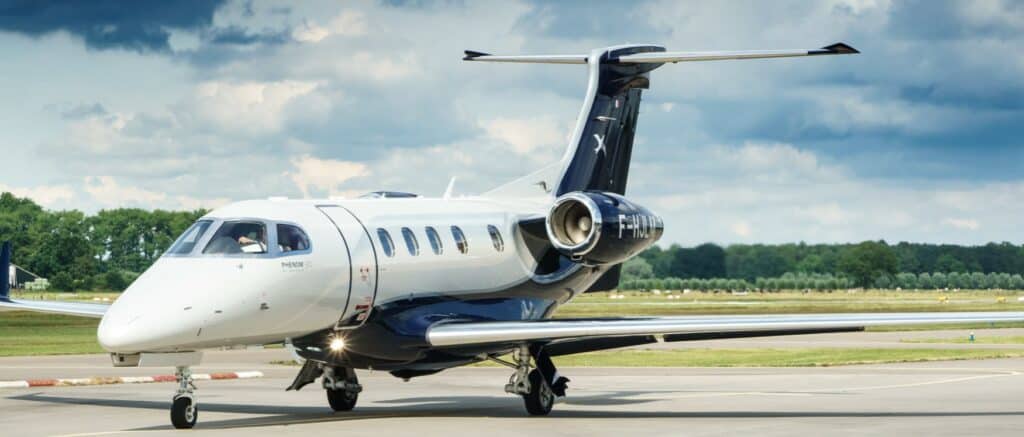So, you’ve been flying around privately for some time now. Renting or chartering private jets for yourself and your traveling crew and booking last-minute seats on 30-people shared flights are all fine options, but when you crunch the numbers, you end up wondering – why not own my private plane?
According to experts, once you start spending more than 200 hours in the air per year, it’s a good time to consider getting your own jet.
And while it’s an enormous one-time investment, it’s actually quite realistic that it will pay for itself in the end.
If you’re not a stranger to spending tens of thousands of dollars on a single flight, then purchasing a several-million dollar jet just for your own flying comfort should be on your list of possibilities.
Since the 2008 recession, and a 2009 drop in prices, there hasn’t been a better moment to buy a private plane. The pandemic has made private jets more attractive and more easily available than ever, both in terms of renting them for flights every now and then or making the sizable purchase of an entire private jet.
According to aircraft sales companies, such as Jetcraft, the new and young millionaires interested in purchasing private jets are increasingly turning to “second-hand”, or pre-owned aircraft. They’re faster to buy and deliver, and quite often in excellent shape.
However, the older and more experienced jet-set crew seems to prefer new, freshly crafted flying goods.
What team are you on?

Giving You a Heads-Up…
Regardless of how experienced a business person you are, don’t get into this by yourself. There is a good reason why there are special companies committed to facilitating the process of purchasing and regulating your private jet as a possession. Unless you yourself are an expert on the topic, we strongly recommend allowing the experts to make sure everything is above board for you. There are just so many things that can go wrong.
These companies can also give you good advice on what type of plane would best suit your flying needs and purchasing power.
Furthermore, keep in mind that you don’t have to own the jet completely. There are other options that come pretty close, such as fractional ownership, or jet club membership cards that give you tons of options when it comes to flying.
Jet club membership cards are being sold by a number of companies, each of them offering different conditions. Vista Jet, Jet Linx, Jettly, Whole Sale Jet Club, AirPArtner are just a couple of popular names.
Furthermore, unless you are a professional pilot, keep in mind that buying a jet is just the first of many expenses that await. But what the heck – what’s $50,000 – $60,000 for a pilot’s salary per year, after you dough out several million dollars for the plane itself? Besides the pilot, there is also the rest of the cabin crew, maintenance and operating charges, hangar costs, taxes, airport fees, fuel, etc.

How to Buy a Private Jet: A Step-by-Step Guide
Here’s a step-by-step guide on how to buy a private jet. Make sure to go through all the steps, as regardless of how much money you have, wasting millions on something that’s not worth even half the money is a painful rookie mistake.
- A Trusted Advisor and Third-Party Support Are a Must-Have
As we argued already, purchasing a private jet is not a minor investment. If it goes wrong, you can lose a lot of money. Of course, there is a range of how much it’ll cost you. Purchasing a second-hand $2 million jet can be seen as a pricey mistake, but what happens if you buy the wrong $15 million – $100 million plane?
This is why collaboration with trusted brokers or advisors is mandatory (unless you’re an aircraft expert yourself).
Companies such as Jetcraft, Jamesedition, Avbuyer, Globalair, Worth, Jetlinx, or Privatefly are some of the top marketplaces for purchasing a private jet. They also employ brokers, in whose best interest is for you to end up a satisfied customer.

However, your third-party support doesn’t end there. You’ll also need a lawyer specialized in aviation, as well as an inspection agency, cabin crew recruitment agency, a financial/tax advisor, and an accountant.
- Figure Out the Details
Where do you want to travel with your plane? How often do you plan on flying? How many people will be traveling with you? What’s your budget?
All these details will determine the type of plane you’ll buy: mid-size, turboprop, small-size, pre-owned, or completely new.
New jets are usually more expensive; however, they come with a five-year warranty, while this security is not a part of the deal when it comes to pre-owned jets.
Also, it’s important that you’re familiar with the context. If you’re flying locally, your country or region may have specific rules and requirements when it comes to commercial flights.
Make sure that you meet those requirements in terms of gear, safety, staff, taxes, fees, etc.

- Demo Ride
While it’s perfectly normal to value the aesthetics of a plane, its comfort, economy, and functionality are in fact far more important.
That’s why we encourage you to take your prospective plane for a demo ride. If you haven’t been on that plane model before, you can perhaps find a charter company that has this plane type on their aircraft, and test its comfort, performance, noise, and functionality.
It’s also possible that the seller will let you have a demo flight, but in turn, you’ll need to agree on some form of commitment such as leaving a deposit before the flight.
- Buying and Administration
Remember all the third-party assistance from step 1?
After you’re done with the test ride, and once you’re certain about which plane you want to buy, here’s a list of steps that you, or rather, your third-party agencies need to undertake to complete the purchase and make you a private jet owner.
- Pre-purchase inspection
Companies such as Jetadvisors, VanguardAirServices, Global Aviation Technical Services, or Cla.aero are just some of the experts that can help you determine whether there are any damages, shortages, or damage history that would reduce the value of your plane of interest.
- Finance and Sales Documents Review
Since we’re talking millions here, it’s quite important that all the documents are sorted out properly and that everything is within legal frames.
If you don’t already have a personal advisor who is an expert on the issue, you can hire a separate agency to cover this step for you. Since aviation is such a specific niche, there are companies specialized solely in the financial or legal aspects of aircraft sales.
Some of them are GlobalJetCapital, AOPA Finance, and ThePrivateJetCompany. These can help address your unique financial context, offer you sales or lease-back programs, advise you on how to negotiate the price depending on your financial power and inspection results, and finally, close the purchase deal.
- Aircraft Registration and Ownership
Every country has its own rules on aircraft registration. Within one country, these can further differ depending on whether you’re an individual owner, an LLC, or a trust registering a jet. Then there are factors such as whether it’s a light sport aircraft or an amateur-built aircraft, etc.
There are also rules on who is and who isn’t eligible to register an aircraft within a certain country.
Lucky for you, all this information is easy to access on governmental websites, and they offer thorough and detailed explanations on what your obligations towards the state are when it comes to owning and registering a private jet.
Furthermore, ownership registration can also get kind of messy if you decide to go for fractional ownership. On the other hand, if you purchase the whole plane, you’re practically managing (another) business: hiring people, planning for maintenance, paying taxes and fees, and managing legal responsibilities.
This is why you need a third-party advisor in this step as well.
- Export Certificates of Airworthiness
If you’re purchasing an aircraft into the US, it’s far more important to consider where the plane is based, used, and maintained than where it’s officially registered. Even if the country of origin is known as a suspicious place, if the aircraft was operated from a legit place, and all the documents are written in English, and they meet all the required criteria, the administrative problems will be resolved in no time.
However, there’s a pretty high level of due diligence necessary when you’re purchasing a foreign aircraft. Each country has its own regulations that both you and the seller need to meet.
Also, previous traveling routes of the aircraft should be determined so that you can identify any potential undischarged liens, as you’d like to avoid this type of surprise on your next trip to the same countries (if there are any).
The most important document you need to obtain at this point is probably the airworthiness certificate. This is issued by DAR the Designated Airworthiness Representative, who is a maintenance technician authorized by the state. Of course, there are many steps to this process that you shouldn’t go through alone. Companies such as BTJOnline, or DuncanAviationAero can guide you through the entire ordeal, providing all the necessary services.
- Insurance Policies
A private jet insurance policy is a pretty big deal. We pay for insurance for far smaller investments such as buying a car, so it goes without saying that you need to get one when buying a private jet, too.
There are many agencies providing this kind of service, such as BWI Fly, USAA, Wings, AssuredPartners Aerospace, EAA, Avemco, Saxon Insurance Brokers, TraverseAviation, AJG, etc.
- Closing and Signing

Needless to say – closing the deal and signing the sales contract is the final step of the process. Once you reach this step, the stressful administration is over, and you’re ready to become a private jet owner!
Summary
Buying a private plane or even going for fractional ownership is a major step in anyone’s life. However, after you spend some time in the air on private flights, you can never go back to commercial. And once you pass 200 hours in the air per year, it’s clear that it pays off to have your own aircraft.
Owning an aircraft is like running a business. If you’re ready to purchase one, we assume you are already experienced in management – or have the necessary funds to delegate the job to someone you can trust.
However, no matter how experienced you are, unless you’re an aircraft expert you should seek support for all levels and steps of aircraft purchase: from choosing the perfect plane to finishing complex administration processes.
Furthermore, discuss with your advisor what you want to do with your airplane. What will be your most common destinations? How many passengers do you plan on taking with you? You need to determine what type of plane will best satisfy your needs.
Once you’re certain about your plane’s specifications, it’s time to take it for a demo ride. Either charter a flight on that type of plane, or ask the seller to give you a ride for a certain deposit.
Finally, if you’re unequivocally sure about the plane type, it’s time to resolve the administration. This is a complex process that requires:
- A broker;
- A lawyer;
- An accountant/expert on finance;
- An inspection agency;
- Assistance in obtaining an export certificate.
Then, all that is left is to close the deal and sign the contract.
What’s up next? Air-trip time in your new toy!

